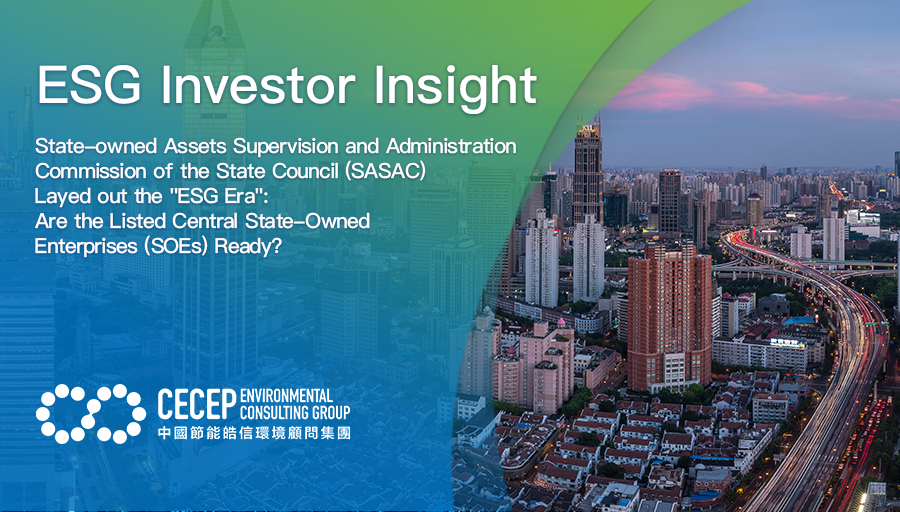【ESG Investor Insight】 State-owned Assets Supervision and Administration Commission of the State Council (SASAC) Layed out the "ESG Era". Are the Listed Central State-Owned Enterprises (SOEs) Ready?

Foreword
On 27th May 2022, the SASAC of the State Council issued the Work Plan for Improving the Quality of Listed Central State-Owned Enterprises (the "Work Plan") to make detailed arrangements for improving the quality of Listed Central SOEs. The Work Plan raises the requirements for domestic environmental, social and governance ("ESG") management and information disclosure to another level and requires "implementing the new development concept and exploring the establishment of a sound ESG system":
01: To further improve the ESG mechanism, enhance ESG performance and play a leading role in the capital market.
02: Actively participating in the establishment of ESG disclosure rules, ESG performance ratings and ESG investment guidelines with Chinese characteristics; and
03: Encourage more listed SOEs to disclose ESG reports, and strive for "full coverage" by 2023.
The implementation of the Work Plan requires all listed SOEs to disclose their ESG reports in 2023. Also, it takes listed central enterprises as the navigator, kicking off the road of ESG with Chinese characteristics. According to the statistics of the China Association for Public Companies, more than 1,400 A-share listed enterprises have independently published ESG reports in their 2021 A-share annual reports, with 49% of them being disclosed by state-owned enterprises, which fully demonstrates that some state-owned enterprises are already adopting ESG concepts in a more positive manner and disclosing information.
For listed SOEs that have not yet disclosed their ESG reports or other listed companies, what disclosure frameworks and guidelines are currently available to serve as a reference for starting ESG management and ESG disclosure work?
ESG introduction and disclosure guidelines
"ESG" stands for environmental, social and corporate governance, which is an important measure of corporate social responsibility of listed companies. In the current capital market, investors can judge a company's investment value based on the company's ESG information, and thus "ESG" has become an essential reference for investment decisions.
At the present time, the international ESG concept and evaluation system consist of three main aspects: ESG disclosure and reporting requirements of international organizations and exchanges, ESG ratings by rating agencies and ESG investment guidelines issued by investment institutions. For example, the Hong Kong Stock Exchange (HKEX) currently requires companies listed in Hong Kong to publish ESG reports in conjunction with their annual reports. In order to further enhance the quality of ESG disclosure information, the HKEX published the Exchange Publishes Listing Committee Report 2021 in March of this year. Moreover, the Chairman of the Listing Committee, Mr. Peter Wilhelm Hubert BRIEN, said that the HKEX would continue to work on enhancing ESG standards and climate disclosure this year.
The Shanghai and Shenzhen exchanges have also introduced ESG disclosure requirements into the listing rules. On 7th January this year, the Shanghai Stock Exchange and the Shenzhen Stock Exchange respectively updated the Stock Listing Rules of the Shanghai Stock Exchange (Revised in 2022) and the Stock Listing Rules of the Shenzhen Stock Exchange (Revised in 2022). On this basis, the Shanghai and Shenzhen Stock Exchanges have clarified more detailed regulations to strengthen the supervision of the performance of the listed companies' corporate social responsibility. Violations in national security, public security, ecological security, production security and public health security, and those with severe circumstances, will be terminated from listing. The exchanges mentioned above are concerned with environmental pollution prevention, emissions, energy conservation and emission reduction, social welfare undertakings, employee rights and interests, supply chain management, customer and consumer rights, investor relations, internal review, and corporate governance structure. etc., made a disclosure request. The Shanghai Stock Exchange and the Shenzhen Stock Exchange also required companies to participate in poverty alleviation work. We believe that after this series of stricter systems, it is the process and determination of our country to build an ESG system, which also indicates that there will be a more open and transparent ESG evaluation and supervision system in the future in line with Chinese characteristics.
Conclusion
We believe that under the construction of an increasingly complete ESG system, companies will face both pressure and opportunities in the face of ever-increasing ESG information disclosure requirements and ever-strengthening supervision. Firstly, to prepare in advance for the exchanges mentioned above to make mandatory disclosure of ESG reports and take regulatory measures in the future. Companies should respond quickly and set up an ESG working group following their development needs to be responsible for the implementation of internal ESG work and start the preparation of ESG reports, and disclose ESG-related information accurately and in detail following the exchange guidelines. Secondly, cutting-edge enterprises in the industry seeking higher standards can continuously optimize their own business and internal governance according to various international standards to obtain high-score certification from various international rating agencies. For more information, please contact us.
References:
1. Work plan for improving the quality of Listed Central State-Owned enterprises-State-owned Assets Supervision and Administration Commission of the State Council
http://www.sasac.gov.cn/n2588030/n2588944/c24789613/content.html
2. Notice on Issuing the " Notice by the Shanghai Stock Exchange of Issuing the Guidelines No. 1 for the Application of Self-regulatory Rules of Companies Listed on the Shanghai Stock Exchange - Standardized Operation"
http://www.sse.com.cn/lawandrules/sselawsrules/stock/main/listing/c/c_20220107_5679270.shtml
3. Self-Regulatory Measures Guidelines of the Shenzhen Stock Exchange for Standardized Operation of Companies Listed on the Main Board
http://docs.static.szse.cn/www/lawrules/rule/allrules/bussiness/W020220107718977234246.pdf
4. ESG, a new threshold for IPO listing? What are the requirements for ESG information disclosure of listed companies in Hong Kong and the United States?
https://cj.sina.com.cn/articles/view/7414172568/1b9eb4b980190169dd
5. State-owned Assets Supervision and Administration Commission of the State Council: Listed Central State-Owned enterprises must disclose ESG reports by 2023!
https://www.163.com/dy/article/H8I8USA40518IJ4K.html
6. What preparations should Chinese listed companies do before the global ESG disclosure standards are released before the end of the year?
https://baijiahao.baidu.com/s?id=1731427544813484972&wfr=spider&for=pc
- Subscribe Us On WeChat -
Official accounts:中節能皓信CECEPEC

中國節能皓信環境顧問集團
CECEP ENVIRONMENTAL CONSULTING GROUP
Sustainability | Environment & Climate Change| Sustainable Finance
Green Building | EnvAI 2.0 | Professional Training
* The information contained herein is for general reference only and there can be no assurance that such information will be accurate at the time of your receipt or in the future due to factors such as policy updates and market changes. The Group does not accept any responsibility for any action taken without due consideration of the circumstances and to obtain appropriate professional advice based on the information contained in this publication. If a third party agency wishes to reproduce the article, the original reproduction must not be modified and the source of the article must be indicated. Prior written consent from CECEPEC is required for any changes to the contents of the articles.
